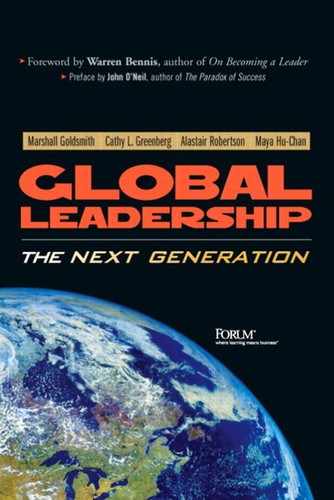Conclusion
Using this book to Help Develop Yourself as a Leader
Peter Drucker is generally considered the world's greatest authority on management. Peter has said that Frances Hesselbein is the most effective executive that he has ever met. Frances served for thirteen years as the Executive Director of the Girl Scouts of the USA. She has served for ten years as CEO of the Drucker Foundation. Frances is a model for demonstrating the process of receiving feedback, listening carefully to what is learned, and being a role model for self-development. While managing the Girl Scouts, she led the process of determining the profile of the ideal leader of the future. She received feedback about herself and consistently followed up with her people. In doing so, she demonstrated how to "walk the talk" as a leader.
You can use the Global Leader of the Future Inventory in the same way. Ask your key stakeholders how your current leadership behavior compares with this desired profile. Learn from them what you are doing well and what you may need to change. Follow up with them on your progress in selected areas for improvement. You may well see the same positive results as demonstrated by Frances!
Frances consistently points out that leaders focus on what to be, not just on what to do. Some things have not changed from the past. The leader of the future will have to demonstrate the personal integrity that shows how behavior matches personal beliefs. Leaders who consistently demonstrate this internal congruence best illustrate the concept of "flow." The high-potential participants in our research impressed us as much with their great commitment as with their great ideas! It was clear that the vision of leadership they describe is not just behavior they want to observe, but behavior they want to demonstrate!
Using This Book to Help Develop Your Team
Throughout this book, we have focused on 15 key qualities of effective global leaders. While no one leader will necessarily be skilled at all 15, a leadership team can be developed to "cover the bases" necessary for success. It might be a good idea to review each of the 15 qualities with your team to determine how important each quality is for your organization's future and how capable you are as a team. As a leader of the team, you can use the 360-degree feedback tool to measure how your behavior matches the desired behavior described in this book. Your team members' perceptions of your behavior may be a better guide than your self-assessment of your behavior. Each of your team members could benefit from the same type of assessment.
The former mayor of New York, Rudy Giuliani, attributes much of his success in managing the 9/11 crises to the team of leaders who had supported him over the years. He believes that the breadth and depth of knowledge in his team helped the entire city make it through this difficult period. He believes that the strong foundation of teamwork that occurred before the disaster enabled the team to handle the challenges that arose after the disaster. In the same way, global leaders need to prepare their teams today for the upcoming challenges of tomorrow. This book provides a good "crystal ball" to help the reader determine what those challenges might be. The resource guide provides a road map on how to meet these challenges.
Global Leadership: The Next Generation
We feel privileged to have interviewed over 200 very special people who contributed their insights to Global Leadership: The Next Generation. The leaders who participated in this study were seen as the "highest potential" of the high-potential leaders around the world.
As noted in the first chapter, we learned that the global leader of the future will have a challenging job! Not only will the "old qualities" of leadership, such as vision and integrity, be important, but new qualities, such as global thinking, demonstrating technological savvy, and developing cross-cultural awareness, also will need to be added to the leader's skills.
The future leaders that we interviewed believe that new times will require new skills. Unfortunately, many of today's leaders have not been educated in these skills or even encouraged to believe that these skills are important.
To prepare for success in the next millennium, organizations will have to either change the mindset of many leaders or change their leadership status. Leaders will have to understand why the new skills are important. They will have to discern what they need to learn and how they can best learn it. The organization's reward and reinforcement system will need to reflect these new competencies.
Every major change produces a challenge. The bad news is that many of today's leaders do not see the importance of these new competencies. The good news is that most of the high-potential leaders we interviewed do see the need for these competencies.
Historically, existing leaders have been expected to mentor and develop future leaders. While this idea will still be true in the future, there may be a major addition to the process—future leaders may also be expected to help mentor and develop present leaders. If future leaders have the wisdom to learn from the experience of present leaders, and present leaders have the wisdom to learn new competencies from future leaders, both parties can share leadership in a way that can benefit their organization.
